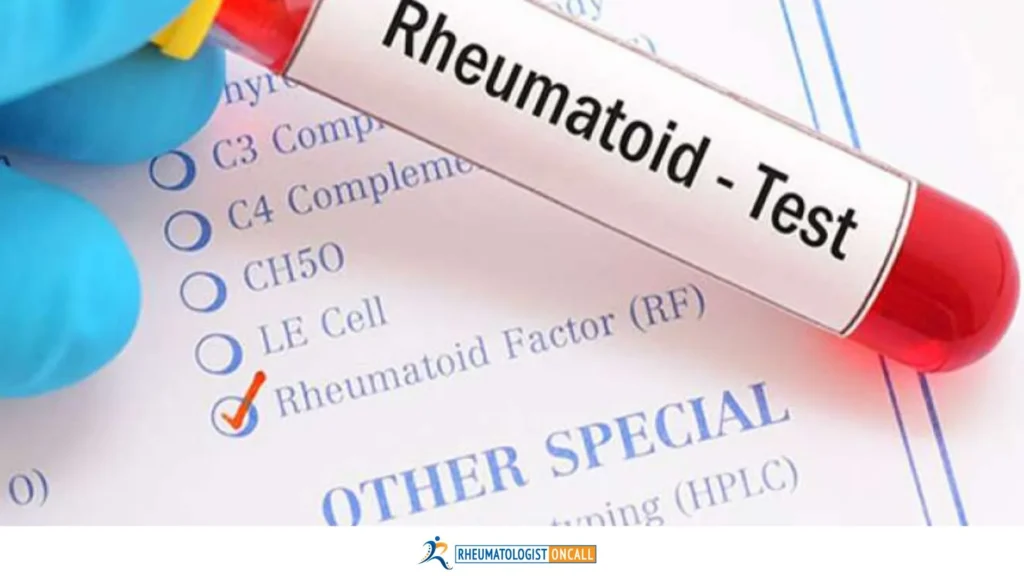SHARE
When Rheumatoid Arthritis (RA) is suspected, your doctor will order many blood tests. Once you receive the results, if they are abnormal, you will receive a referral to see a rheumatologist. It may take between four to six months to see a specialist. Naturally, you will search for additional explanations like:
What are the tests ordered?
What do these tests mean?
Are they confirming the diagnosis of rheumatoid arthritis?
This article will answer in detail all you need to know about Rheumatoid arthritis blood tests.
When to suspect Rheumatoid Arthritis (RA)?

If you have started to have more pain in the hands, feet, or other joints, if you notice swelling in the joints and experience prolonged morning stiffness (more than 1 hour), then you need to be evaluated by a physician.
These signs and symptoms are not usually related to aging. Rheumatoid arthritis tends to affect young people between 30 and 60 years old and the elderly.
Red, swollen, hot joints are suggestive of inflammation.
These signs should prompt you to see a physician, who will examine you and order the following steps to diagnose, like blood tests or X-rays of the joints. We will focus next on the most common Rheumatoid Arthritis blood tests.
What are the Rheumatoid Arthritis blood tests?
Many blood tests can be ordered. Let’s discuss common blood tests for Rheumatoid Arthritis and what they mean.
Markers of Inflammation
We commonly use two blood tests to assess inflammation: erythrocyte sedimentation rate (ESR) and C-reactive protein (CRP). In a patient with active rheumatoid arthritis disease, they both may be elevated, indicating a high level of inflammation. However, there are patients with Rheumatoid arthritis with normal blood tests.
Rheumatoid Factor
Rheumatoid factor (RF) is a common blood test suggesting Rheumatoid Arthritis. However, this blood test is positive in only about 60-70% of patients. Thus, even patients who test negative for Rheumatoid Factor (RF) may have the disease.
Rheumatoid factor (RF) blood tests can also be positive in other conditions, such as
Thus, a positive RF blood test positive does not equal Rheumatoid arthritis. If you want to learn more about the Rheumatoid factor test, watch this video on my YouTube channel.
Anti-CCP antibodies
Anti-CCP (cyclic citrullinated peptide) antibodies is another test commonly ordered when Rheumatoid Arthritis is suspected. Anti-CCP is usually ordered along with RF.
Is this anti-CCP antibodies test better than the Rheumatoid Factor (RF) test?
They are both appropriate blood tests.
However, the anti-CCP antibodies test has a better SPECIFICITY, over 90%. What does it mean? If this test is NEGATIVE, the likelihood of having Rheumatoid arthritis is minimal.
If you test positive for both RF and anti-CCP antibodies, then you most likely have a diagnosis of Rheumatoid arthritis or a high chance that you will develop this disease.
The presence of anti-CCP antibodies was also shown to be related to more aggressive Rheumatoid arthritis disease and with a poor response to treatment.
People who smoke tend to have higher titers of anti-CCP antibodies and more aggressive disease. So, if you are a smoker, this might be the time to stop.
Other tests
As a rheumatologist, my goal is not only to diagnose people with Rheumatoid Arthritis but to make sure that the diagnosis is correct. I must rule out our other diseases that may mimic Rheumatoid arthritis. Thus, tests to evaluate for
are commonly part of the initial panel of laboratory tests for Rheumatoid Arthritis.
ANA (Antinuclear antibody) test and Rheumatoid Arthritis
There is an ongoing debate in the rheumatology community on whether we should or not order an ANA (antinuclear test) when we evaluate a patient for Rheumatoid arthritis.
Personally, I test my patients for the ANA test.
Here are the reasons for the ANA test when Rheumatoid Arthritis is suspected:
- To rule out other autoimmune diseases (e.g., lupus or Sjogren’s syndrome)
- If the ANA test is positive, certain drugs (e.g., TNF alpha inhibitors is better to be avoided)
- If the ANA test is negative before treatment with TNF-alpha inhibitors, we can make further correlations in case of side effects.
Conclusion
Understanding the importance of positive test results like Rheumatoid Factor, anti-CCP antibodies, and ANA tests is crucial when experiencing symptoms such as joint pain, swelling, and stiffness. If you are a patient who experiences these signs and symptoms, seek assistance from a specialized rheumatologist who can address these concerns effectively. Instead of enduring long wait times for an in-person appointment with a doctor, consider opting for an online consultation with a top expert rheumatologist. Online consultations are great alternatives that offer both convenience and access from the comfort of your home. No traveling, no waiting rooms, and, very importantly, no surprise bills. Our company, Rheumatologist OnCall is committed to helping people with rheumatoid arthritis and other autoimmune diseases. Our mission is to provide exceptional medical care, access to top rheumatology specialists, and affordable medical care. We are here to help you if you live in the United States or need a second opinion.














